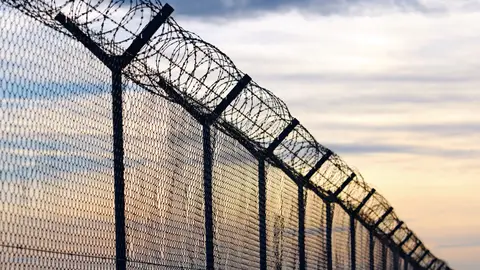Appalling Conditions at ICE’s Transgender Pod Have Hit a Breaking Point

For more than a year, human rights advocates have called for ICE to release transgender asylum-seeker Alejandra Barrera, who came to the U.S. after fleeing anti-trans attacks from a criminal gang in El Salvador.
But her physical and mental health has declined so severely in detention at Cibola County Correctional Center’s ICE trans pod, that last Thursday, advocates warned that they feared for her life. Her attorneys have declined to release specifics on her health condition, citing privacy concerns, but claim she is being denied medical care in detention.
“Amnesty International has grave concerns about ICE’s conduct in its handling of Alejandra’s parole requests,” wrote Alli Jarrar, North America campaigner for Amnesty International, in a media release last week.
Amnesty has argued that there is no reason to deny Barrera's parole, but that the Trump administration is defaulting to blanket denials for asylum claims.
Bamby Salcedo, founder of the TransLatin@ Coalition, argues that the U.S. government is illegally denying Barrera asylum. But Salcedo is also concerned about the realities faced every day by trans women in ICE’s trans pod at Cibola, which advocates demanded be shut down last week.
“I wish that people understood the realities that trans women experience while in immigration detention,” Salcedo tells NewNowNext. “You know, I think the only way that we would know that is if someone from the outside would come and investigate and really make a report or an assessment about all of those conditions.”
Cibola operates ICE’s only transgender pod, which can house up to 60 transgender women at a time. Cibola, run by private prison contractor CoreCivic, has been under fire since May of 2018, when Roxsana Hernández, a Honduran asylum-seeker, died in custody from complications related to dehydration, pneumonia, and HIV. An independent autopsy showed she suffered abuse in custody.
Now, Cibola faces renewed allegations of abuse after 29 trans women detainees sent a handwritten letter to Arizona-based migrant advocacy organization Trans Queer Pueblo calling for an investigation into the facility in late June. The letter grabbed national headlines because the women took the unusual step of risking retaliation by signing their names and asking the organization to publish it in the press.
“Several of us are also not receiving needed medications,” they wrote. “Some officials mistreat us daily, verbally, and psychologically assaulting us.”
The letter alleges that people with HIV and disabilities have been denied medical care and that staff coerced them into signing documents they didn’t understand, falsifying images that don’t portray their actual lives. Those could be the pictures used in a June media tour granted to The Washington Blade, which noted that reporters were not allowed to bring telephones or recording devices into the facility.
ICE spokesperson Britney Walker says that Cibola “operates under best practices contained in the June 2015 ICE Transgender Care Memorandum.”
That document directs ICE staff to place trans people where they will be safest.
However, advocates say that ICE detention isn’t safe for anyone, especially transgender people. They want to see Cibola’s trans pod shut down.
It’s not known how many trans people are detained at Cibola currently. As of July 8, ICE was detaining 135 self-identified transgender people across 32 of its detention centers, Walker explains to NewNowNext. There is no ICE facility specifically for transgender men or non-binary people.
ICE’s willingness and ability to protect transgender people has scrutinized since Hernández’s death and that of El Salvadoran trans asylum-seeker Johana Medina Leon this spring in El Paso, Texas. Leon, 25, died just three days after being paroled out of ICE custody after testing positive for HIV.
Jonathan Beebe Giudice, an assistant at Trans Queer Pueblo, is calling for the trans pod at Cibola to be shut down, as trans people face the same tragic outcomes in the pods as they do in regular detention.
“They claim that these pods are safe places,” Giudice tells NewNowNext. “Throughout the years that we’ve been working in these pods, the reports of violence, abuse, inhumane conditions overuse of solitary confinement ... and then outright torture is the same as outside of the pods.”
Tania Linares Garcia, senior attorney at the National Immigrant Justice Center (NIJC), adds that such pods also geographically isolate LGBTQ detainees.
“I have transgender clients in other parts of the country who could benefit from being in a ‘safer housing unit,’ but they have to choose between being able to see their families and their communities and being safe," Garcia tells NewNowNext.
Activists have made some headway in securing releases from Cibola since Hernández’s death last year.
Over one"]
Protestors in San Ysidro, near the U.S.-Mexico border.
Last July, the Sante Fe Dreamers Project and the ACLU helped win freedom for 14 trans women at the facility after a federal court injunction ordered ICE to halt blanket denials of asylum claims at some of field offices.
Allegra Love, executive director of the Sante Fe Dreamers Project, told INTO last year that two of the women released had been going blind because they were denied syphilis treatment.
“We had to rush five people to the emergency room as soon as they got out of the prison on Saturday,” Love said at the time.
But Barrera, a trans activist for more than a decade, was not among those to be released. Advocates claim that a lack of medical care has dangerously exacerbated her health problems.
NIJC has filed a petition for her release, arguing that her 19-month detention violates the Fifth Amendment’s due process protections against indefinite detention.
According to Garcia, Barrera's case is representative of many trans people in detention who face abuse and excruciating mental health challenges.
“For most transgender people in detention, their choices are being placed in a housing unit according to their gender assigned at birth or being in solitary confinement for prolonged periods,” Garcia says.





